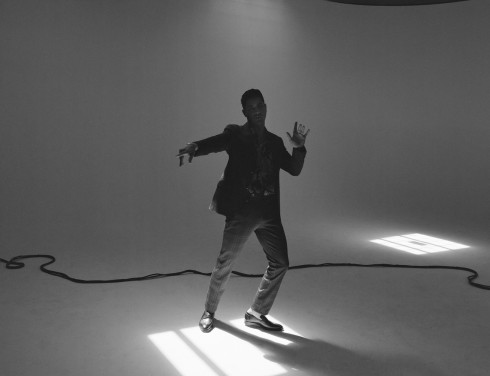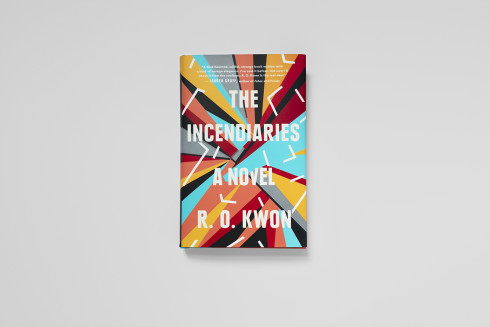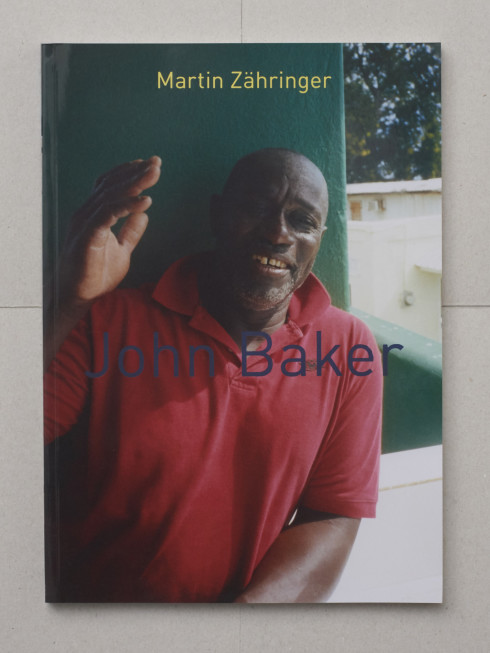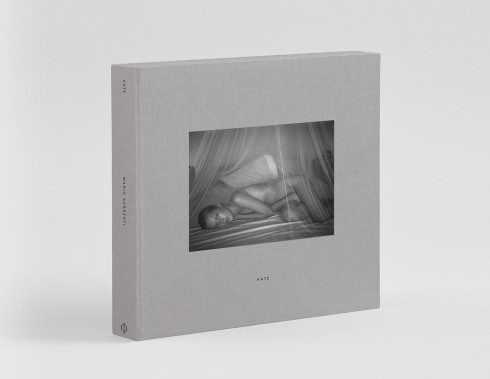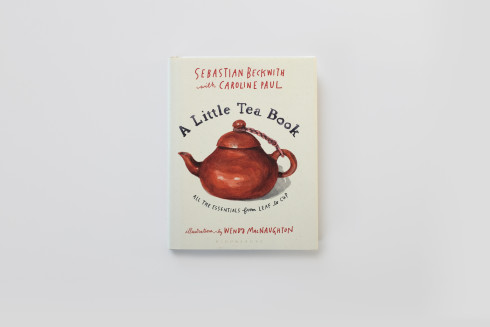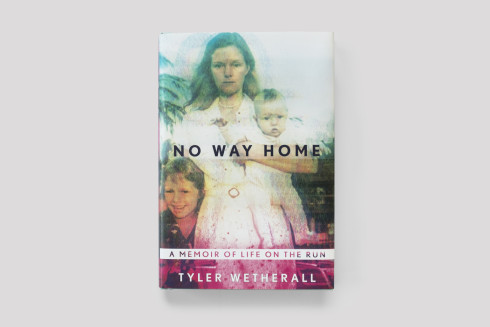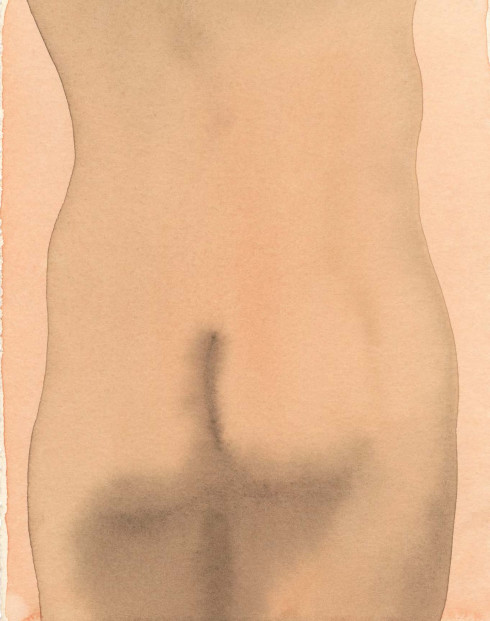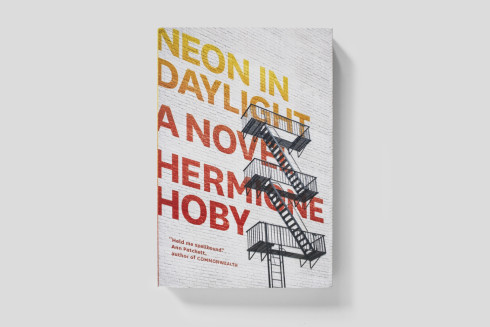
THE LAST WORD - EGON'S PARENTS
David Rice’s short story “Egon’s Parents” offers a surreal take on guilt, responsibility, and identity. Read it here as part of our Last Word series of original fiction.
Ed was in his pickup truck driving the gravel out back of his shitty town in Idaho one Friday night in spring when he hit and killed Egon, until then a freshman at the town’s college, where, it was said, East Coast fuck-ups went to die.
Before it happened, Ed had been hauling out to Jeff’s house for a late-stage high school free-for-all of the sort that had only been getting more frequent and vivid since the start of senior year’s semester two, and would peak, he assumed, sometime in midsummer, after prom, before it all came crashing down and a critical mass went their separate ways in August.
He, Ed, for what it was worth, had lately been thinking he might go out to California, try to see what that meant. He’d learned, from a war vet he knew in town, that San Francisco and Los Angeles were two different places, and that one shouldn’t be averse to kicking around awhile in both or either.
At least until he’d made it somehow into his twenties, as he saw it. By then there’d probably be something he’d have to get around to.
And what’s more, this vet had said, there was Mexico.
Ed hadn’t spoken to his parents in over a year. He rented a room above a hardware store on the section of Main Street that started to become the Strip, which led all the way up past Walmart to the northernmost highway entrance, which he planned to take onto the highway to California when the time came, handing in his keys and name tag at the hardware store where he worked a few dead-boring weekend shifts a month in exchange for the room and a little something on top.
This Jeff of his lived way out, probably the farthest of anyone he knew.
He was still driving, getting closer.
His thing lately was he liked to tell people he was still a virgin though it wasn’t technically true. He couldn’t have said quite what the appeal was, but it had become something he could be relied on to say at parties, an entertainment, almost a routine, even though it was only a single sentence, and once he’d said it, it was done.
He pictured a California, as he drove, that would shear off the virginity that Idaho had failed to touch, offering one pale Caitlin and Jennifer after another in lieu of the real thing.
He kind of enjoyed this kind of thinking. It kept him awake and made him feel like a more with-it guy than he necessarily always was.
He drove fast, though not as fast as he could have. Probably everyone who was already at the party had driven much faster. It only mattered that he didn’t drive so slow that the freaky road-feel of being this far shy of downtown hit him all the way.
The back center of the pickup was weighted down with plastic gallon vodkas and two thirty-racks of Keystone Ice, under packing blankets with scrap metal from the hardware store that he was supposed to have taken to the dump.
It was his night to haul. Until he got there, the party was BYOB, no one’s idea of a night out.
Everyone had their own way of buying it. For Ed, it was that war vet he knew, a reliable bastard though a bad piece of work, so they said. Two for you, one for me was the vet’s deal these days, whether it was bottles or cans.
So here he was hauling, running lists and numbers, cost-benefit analyses, a little manic, around 11PM, when Egon’s SUV came rattling up the road toward him, scraping the shoulder of the opposite lane, not that there was any drawn median to speak of.
It was not only the first other vehicle Ed had seen tonight, it was the first he’d ever seen on this road anytime after dark since he’d gotten his license over a year ago.
The first thing he saw was the New Jersey license plate. Ed wasn’t a plate-reader by nature, but the unlikelihood of coming across any car at all out here was enough to beg the questions of who and from where?
Those plates were where his eyes started out. If they’d stayed down there, Egon would be alive or dead by another means. The physics were such that it would not have been hard to glide past.
But Ed’s eyes slipped up, off the plates and over the hood and clear through the windshield, coming to rest on Egon himself, alone in the universe behind the steering wheel on this shitty town road far enough from his fuck-up college to be fully unknown to it, cruising almost certainly without a destination.
The path that Ed’s eyes traveled into Egon’s kept him going in that direction, wrenching him out of his lane and across the gravel, almost off the ground, through the air.
In brute response to what he saw in Egon or felt in himself, a pity or a fear, Ed seized and firmed up in his system, got thick and sure very fast, felt time getting wet and slimy, gripped the steering wheel so hard his hands went numb as gloves, and shoved himself head-on into the SUV, ducking to one side so the airbag didn’t maim him.
He barely heard the impact, only heard Egon give way.
Or didn’t so much hear it as feel it like an armored insect being crushed by a rock.
There passed a spell with Egon dying and Ed huddled beneath and beside the airbag.
Then he leapt onto the gravel, running head-down so as to avoid glimpsing the carnage, though he smelled it burning, around to the pickup’s bed, which he climbed into and hurled off the blankets and pried open and tore with engorged and sharpened fingers into the beer cases, looting out fistfuls of cans and squeezing open the gigantic plastic bottles, shooting it up his nose and into his eyes and all around his collar, making a bath of his neck and head.
He chugged hard and fast, scarcely breathing, pouring beer and liquor down his throat at the same time, and some splashing into his ears, feeling his chest and belly swell to hold it, burning the gassy liquid straight up his system.
He figured he had at best fifteen minutes to get convincingly drunk enough for there to be no question in anyone’s mind, ideally not even his own, about what’d happened here, and he was starting from scratch.
By the time the cops and ambulance arrived, racing each other—the road was not so remote that the crash hadn’t been heard in at least one home—Ed was more than drunk enough, almost so drunk that it seemed implausible he’d been driving at all.
Hands were on him, muttering voices, flashing lights.
He was locked up, told he’d be dealt with in due time and to sit tight till then.
He knew everyone locked up around him, and the guards, but no one would engage. It wasn’t hatred; it was just that no one wanted any part of it.
He could tell his life would be different from here on out, and that that difference had already begun.
Egon’s body had been towed and scraped and cleared away, and the rest of Ed’s senior year fed into a blur. His friends paid respects and then dissipated, and it grew uncertain whether there’d be a future, much less what it could hold.
A few days after his last visitor had come and gone, and a few more days of silent thought, trying to get clear on what he’d done and wanted to do, he requested writing materials and wrote a letter.
He tried to make his apology profound without implicating the truth. He stuck with the folktale of seventeen and drunk, a little too happy for anyone’s good. He said he really meant it, that he was sorry, that he was far into shame and guilt and might or might never come out. That he had done something he hadn’t intended and would give anything he had to undo.
Asked his captors to post it to Egon’s parents, whose name he’d read in the papers, wherever in New Jersey they were.
The letter was taken and Ed told again to sit tight.
He did, for a month by his count.
He did push-ups like in a prison movie and slept a great many hours and did some more thinking, though it began to loop.
Then, a letter came for him. It had been opened and probably scrutinized, but there was no redaction.
Dear Ed, it began.
It took us a month to open your letter. We had to let it sit that long, on the radiator. We thought about tossing it. You killed our son. Our only.
We came close to tossing it.
But at last we read it. It was the right thing. And we thought hard, and prayed, and waited, and went on grieving, and pondered your admission, the pain it was clear that you felt, and came to the consensus, hard as it is even for us to accept, that we forgive you.
Well and truly.
We do not understand, and never will, but we forgive you.
You are forgiven.
Sincerely, Egon’s parents.
Ed took his time drafting a response.
The matter was not concluded, though he could see good reasons why it should have been, and would in retrospect wonder whether perhaps a simple failure to reply, on his part, at this point, would have been enough.
He knew that, in all likelihood, he’d be released from captivity here in Idaho and sent on his way before long, but could see that such freedom wouldn’t be real, that he’d only fall further down the hole he’d opened up.
So, when he was ready, he requested the same writing materials he’d used the first time, and wrote:
Dear Egon’s parents
It seemed he’d written only that when they showed up, talked to the people who were holding him, and had Ed out, in the only café in his shitty town in Idaho that he never went to because his parents were always there.
They weren’t there now.
The fact of it being a café he never went to had the effect of making him feel like the whole town had been transformed, everything he could see, taste, and otherwise grasp made new, washed in the arrival of Egon’s parents.
They all sat behind identical blueberry muffins and for-here cups of coffee, neat as name tags on a panel.
No one ate or drank.
There was a rack of Christian sympathy cards on one side of the café, books and pamphlets on the other, and the shell of a theater across the street, haunted by teenagers who formed a segment of the circle that Ed used to belong to.
Egon’s parents watched him. He couldn’t tell if they were waiting for him to make a move or freezing him in place.
Finally they said, “The horrible thing was not set in stone in the future, before it happened, but it is now set in stone where it resides in the past, and, all platitudes and pleasantries aside, we are here to help you accept and understand the truth of this, since you are both the perpetrator and now the only living victim of the horrible thing.”
He wasn’t sure if they’d said all they were going to or if there was a second part slipped in while he was stuck on the first, but very soon it was decided.
He would come back to New Jersey to live with them, to cope.
“The body has been adequately disposed of,” Egon’s parents said, getting into their Audi, sporting the same NJ plates as Egon’s SUV.
“So there is nothing to keep us here.”
They handed him an envelope, sealed with the insignia of his high school. He looked for some confirmation that he should open it, and found what he was looking for.
Inside was an official diploma in his name, claiming that he’d completed all credits and graduated in good standing, with a 3.2, despite having missed more than a month of the end of senior year and made nothing up, taken no exams.
“You are free of this place,” said Egon’s parents, getting onto the highway at the entrance at the end of the Strip that he, Ed, had for so long envisioned as the start of the road to California, in a future that had seemed likely.
It took a very long time to drive to New Jersey, far longer than he would have thought. His idea of how far it was hadn’t been realistic. He’d seen plenty of maps in his time, but never internalized their full scale.
He slipped down on the backseat, restrained from going edgewise by the seatbelt, which Egon’s parents had insisted he wear.
As they sped across the States, even apparently dipping up into Canada, the belt cut off his circulation. He slumped over and felt like he couldn’t breathe. What was passing by the windows started to look soupy and secondary, like a scum between him and the main thing.
He blinked, as if by wiping his eyes he’d also wipe the windows.
He came to in a smell of fries and chicken.
He accepted the container that Egon’s parents offered. After a few bites, shifting the lettuce and tomato to one corner, Egon’s parents summoned it back.
“For later,” they said, returning to the highway that led through what the signs said was Ohio, patrolled by unmarked aircraft.
When they got off at their exit, it was so late that even the all-night gas station convenience mart was closed, so it meant no milk or OJ. Egon’s parents griped about how, since a new family had taken over the all-night mart, it was hardly ever all-night anymore, though they’d declined to remove or amend the sign.
“Even the gas is worse,” they griped.
Their opinion seemed perfunctory, part of the homecoming.
They stepped inside their house and toppled a pile of mail. Seeing and hearing it fall, he was reminded of the letter he’d sent them, which had sat unopened for a month on the radiator but had then led to this.
“Your room is upstairs on the right,” said Egon’s parents.
It was only upon entering his room, which seemed not only dark but darkened, as if some preparation had gone into the effect, that he remembered he’d brought nothing with him. He had no clothes, books, materials of any kind. He felt like an undocumented immigrant, save for his diploma.
He stripped to his boxers and peeled back the bedspread, lying down on sheets that smelled clean but felt pre-touched. His eyes found the ceiling and he stretched his toes, protruding like they’d had to tear something to get out, and the ceiling started to drip with memories of the killing-crash, long wet strands like pumpkin innards, dripping down onto his chin and Adam’s apple.
He was starting to imagine that he didn’t like it here, enough to decide it might be best not to fall asleep.
So he prepared to lay awake all night with the question of whether, given the chance to kill Egon again, he would.
He expected this question to grip him through to a miserable dawn, flopping him back and forth like something beached, but, instead, he got his answer right away, just as he had the first time, out on the road.
Yes, was the answer.
I’d crush his skull with a brick if I had one and he was here.
It refused to remain unresolved. Having burned through what he’d elected to keep him awake, he fell asleep. He went way down into Egon’s bed, all the way to the root.
In the morning, he put on Egon’s flannel robe, sweatpants, and leather slippers.
He had not yet put on Egon’s underwear, but, as he pissed and washed his face before taking the stairs, he could see this would soon become necessary. The boxers he wore now, old and rank from Idaho, would be lost in the wash, and he knew he’d never see them again.
Egon’s parents were sitting at the breakfast table, a newspa- per leafed out between them. Looking through the glass doors behind the breakfast chamber, he couldn’t firmly tell what season it was. He feared he’d be unable to remember the four options just now, so he didn’t try.
He tried, instead, to eavesdrop on the newspaper, but Egon’s parents crinkled it away, subtly but not so subtly that it wasn’t clear they were hiding it.
Even the name of this town in New Jersey was hidden. It seemed fair to expect the paper to reveal this much—The Somewhere Herald or Something Gazette—but it looked to be a mere New York Times.
He saw a giant pile of older papers in the dry sink beside the breakfast table, and pictured the current one lost among these soon enough.
He poured a bowl of Mini-Wheats and sat down, farting a little as he did, looking forward to a shower.
There was still no milk, so he ate them dry like pretzels, and drank black coffee and water.
Egon’s parents sat there having apparently awoken much earlier—their food was long gone, coffee cold and sedimented—but they were in no visible hurry out the door. They didn’t seem eager even to clear their places and move from early to mid-morning within their own home.
The light outside looked pale and mild. He didn’t think it’d give him any trouble if he went out into it, but he didn’t think he’d try.
Not today.
So this was the first full day indoors.
He went up to Egon’s room after breakfast and waited till lunch. Then till dinner. The light stayed pale for a long time, trying hard to give him a chance.
Then it went black.
He held his position in the bed, making it very clear where he was and where he was not, like some needle was planning to fall from the ceiling and would miss him if it could.
He could tell that he still hadn’t showered, but didn’t think he could manage it right now. Later tonight maybe, or tomorrow at the latest.
There were mobiles and dreamcatchers hanging from Egon’s ceiling, none close enough to clank together, but they kept trying.
The surfaces in Egon’s room were undisturbed. The main desk, the night table, and the top of the dresser were covered with papers and notes, business cards, coins, safety pins and buttons, ticket stubs from concerts and sporting events, and the bookcases were stuffed with books, folders, binders, CD’s, and DVD’s.
His eyes roved from the bed over all this material.
A few days passed.
There were still meals downstairs, but they made little impression on the smoothness of time. He sat quietly at the dinner table until he was told to go up to bed. The meals were chicken potpies and beef stews, defrosted in the oven. There was never takeout or anything cooked from scratch. They never got milk, to the point where he stopped pouring his cereal into a bowl, eating little piles of it off of paper towels and napkins instead.
He spent so much time in his room that he couldn’t tell if Egon’s parents left during the day to work and shop and run errands in town, only returning at dinnertime, or were still spending their days downstairs, sitting quietly, drinking coffee, diminishing the supplies from some basement storeroom.
There was no explicit prohibition against his coming down- stairs except for meals, but he never tried it.
He found time to shower here and there. Under the water, free of Egon’s parents, he began to cull the strength to empty the room, purge the detritus that was turning more minatory the longer he spent amidst it, like a bed of grass and reeds turning cold and wet as the water table beneath underwent some climatic shift.
These things are stifling me, he thought, emptying a bottle of conditioner over his head and neck. I am sinking into them.
Out of the shower, dried off, he stepped into Egon’s boxers, elastic busted so they hung like a diaper.
Over a few more days, he formulated a plan to steal a trash bag from the kitchen after dessert, in the minutes when Egon’s parents were puttering around with the recycling by the garage.
Throughout the hours in bed, the plan came to seem immensely detailed and complex, but when the time came to execute it, there was almost nothing to be done. He simply pulled the trash bag from the roll under the sink and walked upstairs.
Then it began. He stuffed everything he could inside, all the scraps of paper that Egon had left behind, covered with scribblings that, apparently, amounted to the miscellany of his thought during the years he’d lived in this room.
All the journals, sketchpads, card collections, rolled-up dollar comics and a few valuable ones in plastic sheets, baby teeth and stale unused condoms and back issues of GamePro and some FHM’s with the body pages ripped out, the ads and articles hanging ragged from distressed bindings.
Once the bottom of the bag was lined with loose material, he went further, tearing down posters and postcards strapped to the walls and all those mobiles and dreamcatchers from the ceiling, crushing and stuffing them into the bag like badly-killed birds, their wiry extremities tearing holes in the plastic.
It was his bid for survival.
This came as an obvious but long-delayed revelation. That’s why the plan had seemed so elaborate. He hadn’t seen it this way a minute ago, but now it was clear. He would pack the bag as tight as possible, despite the holes, and fling it from the house.
If he could get Egon out of this room, he could go on living in it, possibly forever.
He tore down the wallpaper and peeled up the floorboards, all of it coming off as easily as the skin from a piece of soft fruit. The room got see-through as he peeled it, almost dreamily, revealing a sort of membrane, subtly veined, gray and shrimp-like, encasing it from the night outside.
He took a break, huffing, the air cold and fresh now.
Looking down through the floor, he could see that Egon’s parents had left the kitchen. He had to hurry; he shouldn’t have rested.
Dragging the trash bag, too heavy to lift, he heard their knock and had to open the door.
“Empty it,” said Egon’s parents, quickly aware of the whole situation.
He tried to picture what would happen if he disobeyed. Couldn’t.
So he did as he was told, pouring the contents into a pile on the floor that grew so tall and sharp it choked the room, the soft membranes sagging and groaning, resisting puncture.
Then he handed over the empty wrinkled plastic.
Egon’s parents bore it away.
When they had gone, he tiptoed around the pile, trying to keep his balance like a kid in a blow-up bouncy house.
The bed had been completely obscured, so he crawled into a nest of paper and metal and closed his eyes. Spikes rested on his back, just heavy enough to tickle, and the night outside settled in to watch.
At breakfast the next day, Egon’s parents read their Times as usual, expressions glum and fixed. The incident was not mentioned except that he was informed he would receive his meals in his room from now on. A tray would be set out twice a day, the first of which would contain enough to save some for lunch if he so desired. It would be the same tray both times, so if he desired dinner he was advised to set the empty tray outside his door no later than 4PM.
Sundays he could still come downstairs for breakfast.
He lay huddled beneath the pile he’d reduced the room to, his face pressed into the transparent floor, and, deep in the night—insomnia had arrived at last—he could see Egon’s parents sitting at the table, facing one another.
At first, he couldn’t tell if they were talking. They were very still, like they were sitting there posed, perhaps in positions they’d sleepwalked into or fallen asleep in, but, despite the lack of evidence, he became convinced that they were discussing his future, deciding what to do with him or, having decided long ago, when to do it.
It took him back to the beginning of his life, when he’d lived with his parents and made his requests for pets and special privileges just before bed, and was always told that they’d discuss it while he was asleep and tell him their verdict in the morning.
And each morning he’d come down and ask them what they’d decided, and they’d ask him what he meant.
Eventually, the suspense became too much.
He’d known since the beginning that his time in this house might eventually take a turn or come to an end, and had even, to a degree, known that before sending the letter, and was prepared to accept whatever it proved to be, but watching Egon’s parents through the floor, as they sat at that table and talked about him, became more than he could bear.
Exhausted, eyes hot and dry, mouth sour and salty, he stood up under the pile of rubble, balancing on the gummy membrane of the floor, and began to piece the room back together.
He grabbed handfuls of material, which had decomposed into a sort of paste since he’d torn everything down, slicked by some moisture, its own juices apparently, and spread it over the floor and the walls, standing on his tiptoes to minimize footprints.
When that was done, he threw up handfuls at the ceiling, closing his eyes as it rained back down.
It smelled like mulch and wallpaper glue, dizzying but gentle.
When the floors and walls were fully covered, returned to opacity, he lay down, feeling streaks of it hardening in his hair.
It was a tremendous relief to be spared the sight of Egon’s parents at the table downstairs. Whatever they were discussing, whatever they had in store for him, they could knock on his door when the time came.
He would open when they did, but, until then, he would sleep.
THE END.
David Rice is a writer and animator from Northampton, MA, currently editing his first novel. His stories have appeared in Black Clock, Identity Theory, Spork Press, The Bad Version, NACHT, and The Harvard Advocate. He writes the ongoing web fiction project A Room in Dodge City and the graphic series Lazy Eye Stories. He’s online at www.raviddice.com.

